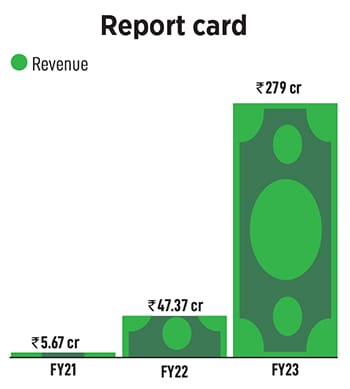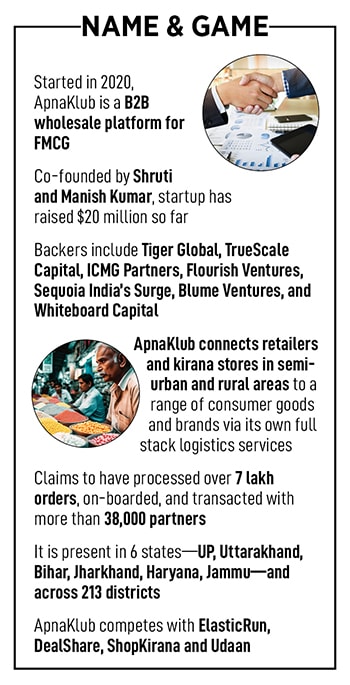ApnaKlub: Uplifting kirana, one brand at a time
ApnaKlub is stepping up its kirana play across tier 2 and beyond by rolling out a slew of its own brands. Will the gambit of a B2B wholesale platform for FMCG pay off?


For years, Badrinath Gupta endured a bunch of endemic issues plaguing his business. The kirana owner lists the vexing problems in order of severity. “Uncertainty has been the biggest worry," rues the 45-year-old shopkeeper, who started a modest shop in Etawah, some 224 km from the capital city of Uttar Pradesh, in 2015. “There is no predictability about his arrival," he says, alluding to the erratic schedule of the FMCG salesman who makes a fleeting visit to the small town twice a month.
The second pinprick, Gupta points out, is the absence of the right kind of assortment. The kirana entrepreneur had little choice and say in deciding the SKUs of various brands. “My stock was always shoved down my throat," he laments, explaining his predicament. The third problem revolved around profitability. “It was stagnant for years. And this was despite rising sales," he says. “I knew there was money in kirana, but somehow there was not much for me," he adds.
Some 1,930 km from Etawah, Manish Kumar saw money, and an untapped opportunity, which the big boys of retail ignored for decades. The grad from Patna University, who is now based out of Bengaluru, explains how he spotted the elephant in the room. Big retail and FMCG players, reckons Kumar, who started his professional innings with Big Bazaar and spent over seven years there till May 2011, always intended to go deep and wide in tier 2 and 3 cities, and beyond. The logic, and pull, was simple. An ever-booming population, which had money to feed its growing aspirations, was a lucrative catchment area for all kinds of domestic and foreign FMCG players.
For Kumar, the final push came in the form of an entrepreneur whose fledgling travel venture got battered during the Covid-19 pandemic. Shruti, who goes by her first name, was looking to start her second entrepreneurial gig in a segment which had two critical attributes. First was resilience. “There is nothing better than kiranas," says Shruti, who completed her engineering from IIT-Delhi, went on to finish her MBA from Harvard Business School, and started her professional career with Bain & Company in 2012. After two years, she moved into the field of impact investing and worked for over three years. Now in early 2020, she was getting ready for her second innings.
The second attribute, Shruti explains her shift from travel to kirana, was a big pain point and a pressing need for disruption. Kiranas again scored high on this count. Though the small store owners were exposed to technology in the form of digital payments and some rudimentary form of store digitisation, the makeover was still vastly incomplete. “They were alien to data analysis, and ignorant of tech know-how to streamline the business," says Shruti, who started ApnaKlub in 2020.
Three years later, the kirana club has swelled. It has raised $20 million in funding counts Tiger Global, TrueScale Capital, ICMG Partners, Flourish Ventures, Sequoia India’s Surge, Blume Ventures, and Whiteboard Capital among its backers and is present in six states—UP, Uttarakhand, Bihar, Jharkhand, Haryana, Jammu—and across 213 districts. “We have processed over 7 lakh orders, and transacted with more than 38,000 partners," claims Shruti, sharing the heady growth. The revenue from operations increased from ₹5.67 crore in FY21 to ₹47.37 crore in FY22. ApnaKlub closed FY23 with an operating revenue of ₹279 crore. Though the venture is making losses, a rapid growth in the topline and an audacious bid to roll out a slew of private label FMCG and food brands, had made the investors stay glued to the growth story.
 Tilman Ehrbeck tells us why ApnaKlub is a promising bet for his venture fund. “ApnaKlub has developed a capital-light model for hyperlocal inventory distribution to kiranas in India’s tier 2 and 3 towns," avers the co-founder and managing partner at Flourish Ventures. “They seek to optimise India’s retail supply chain and uplift kirana store owners," says Ehrbeck, who was impressed with the ability of the founding team to scale the venture. “They have deep market insight and are driving meaningful change for India’s 12 million small retailers," he adds.
Tilman Ehrbeck tells us why ApnaKlub is a promising bet for his venture fund. “ApnaKlub has developed a capital-light model for hyperlocal inventory distribution to kiranas in India’s tier 2 and 3 towns," avers the co-founder and managing partner at Flourish Ventures. “They seek to optimise India’s retail supply chain and uplift kirana store owners," says Ehrbeck, who was impressed with the ability of the founding team to scale the venture. “They have deep market insight and are driving meaningful change for India’s 12 million small retailers," he adds.
Meanwhile, Gupta in Etawah gives us a glimpse of how ApnaKlub is stepping up its kirana play.
“The demand for Glenzo and Apna Shine have picked up over the last few months," says the kirana owner. “The quality is good, and the margin is much better than what I was used to," he says. Glenzo toilet cleaner and Apna Shine utensil cleaner are a handful of private brands rolled out by ApnaKlub over the last quarter. “Both are now striking a run-rate of over ₹7 crore," claims Shruti, adding that the startup has rolled out a food brand Nutphat. “There is a big gap in catering to regional needs, nuances and tastes of India," says Kumar. “The club will keep swelling as more users and brands join ApnaKlub," he signs off.
First Published: Nov 22, 2023, 16:53
Subscribe Now There was one problem, though. A dominant share of the business for the retail biggies, and profit, used to come from top cities and tier 1 towns. What this means is that in spite of good intent, small towns and millions of mom-and-pop stores never got the attention they deserved. “This was a big gap," says Kumar, who spent close to nine years with Walmart and Metro Cash & Carry till March 2020. “And this was a big opportunity," says Kumar, who had one-and-a-half decades of wholesale B2B experience, and was now mulling to start on his own. “Though I was ready, I was a bit hesitant in taking the plunge."
There was one problem, though. A dominant share of the business for the retail biggies, and profit, used to come from top cities and tier 1 towns. What this means is that in spite of good intent, small towns and millions of mom-and-pop stores never got the attention they deserved. “This was a big gap," says Kumar, who spent close to nine years with Walmart and Metro Cash & Carry till March 2020. “And this was a big opportunity," says Kumar, who had one-and-a-half decades of wholesale B2B experience, and was now mulling to start on his own. “Though I was ready, I was a bit hesitant in taking the plunge." 